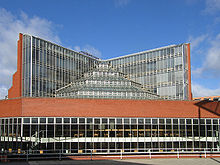The Faculty of History is one of the constituent departments of the University of Cambridge.
 The faculty building on the Sidgwick Site | |
| Type | History |
|---|---|
Parent institution | University of Cambridge |
| Location | , , |
| Website | www |
Teaching and research of history has centuries old roots at Cambridge and the first Regius Professorship of Modern History was established by King George I in 1724. The History Faculty is one of the largest history departments in the world with well over a hundred faculty members. Each academic year a new intake more than two hundred undergraduates is admitted and the Faculty also has more than 450 graduate students studying for masters degrees and the PhD.
Cambridge's History Faculty is consistently ranked as one of the best history faculties in the world[1] and is almost always ranked first in the UK.[2] It is notable among Cambridge's faculties for the influence of its alumni in public life.
The Faculty is divided into eight subject groups (i.e. areas of research and teaching): American History; Ancient and Medieval History; Early Modern History; Economic, Social and Cultural History; Modern British History; Modern European History; Political Thought And Intellectual History; and World History.[3]

Courses offered
At undergraduate level, the faculty offers three courses (known as tripos) that result in a Bachelor of Arts (BA) degree. These are the Historical Tripos, the History and Politics Tripos, and the History and Modern Languages Tripos.[4]
At postgraduate level, the faculty offers three types of degrees: Master of Philosophy (MPhil), Master of Studies (MSt), and Doctor of Philosophy (PhD).[5] The MPhils are 9 month to one year courses, consisting of taught courses and a research dissertation; there are eight MPhils, one for each of the eight subject groups.[6] The MSt is a two year part-time course, consisting of taught modules and a research dissertation: it is jointly taught by the Faculty Of History and the Institute of Continuing Education.[5][7] The PhD is a research course, taking 3–4 years full-time and 5–7 years part-time, and resulting in a doctoral thesis of 80,000 words.[8]
Notable academics
There are a number of professorships, including endowed chairs, within the department:
- Regius Professor of History (currently Sir Christopher Clark)[9]
- Paul Mellon Professor of American History (currently Gary Gerstle)[10]
- Professor of Medieval History (currently John H. Arnold)[11]
- Smuts Professor of Commonwealth History (currently Saul Dubow)[12]
- Vere Harmsworth Professor of Imperial and Naval History (currently Samita Sen)[13]
- Dixie Professor of Ecclesiastical History (currently David Maxwell)[14]
Alumni
References
- ^ https://www.topuniversities.com/university-rankings/university-subject-rankings/2019/history
- ^ https://www.thecompleteuniversityguide.co.uk/league-tables/rankings/history?tabletype=full-table
- ^ "Subject Groups". Faculty of History. University of Cambridge. Retrieved 23 September 2017.
- ^ "Undergraduates". Faculty of History. University of Cambridge. Retrieved 23 September 2017.
- ^ a b "Graduate courses and prospectus". Faculty of History. University of Cambridge. Retrieved 23 September 2017.
- ^ "The MPhils". Faculty of History. University of Cambridge. Retrieved 23 September 2017.
- ^ "MSt in History". Institute of Continuing Education. University of Cambridge. Retrieved 23 September 2017.
- ^ "Course Outline: The PhD in History". Faculty of History. University of Cambridge. Retrieved 23 September 2017.
- ^ "Professor Chris Clark". Faculty of History. University of Cambridge. Retrieved 23 September 2017.
- ^ "Professor Gary L Gerstle FBA". Faculty of History. University of Cambridge. Retrieved 23 September 2017.
- ^ "Professor John H. Arnold". Faculty of History. University of Cambridge. Retrieved 23 September 2017.
- ^ "Professor Saul Dubow". Faculty of History. University of Cambridge. Retrieved 23 September 2017.
- ^ "Professor Alison Bashford". Faculty of History. University of Cambridge. Retrieved 23 September 2017.
- ^ "Professor David Maxwell". Faculty of History. University of Cambridge. Retrieved 23 September 2017.